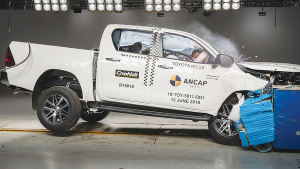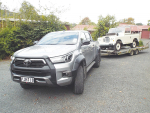In its first test in 2015 the eighth generation Toyota Hilux gained a 5-star ANCAP rating.
It was recently re-submitted for testing against the more stringent 2019 criteria and the venerable ute again came away with 5 stars.
The upgraded ANCAP rating stems from a bunch of mid-life safety additions.
These include autonomous emergency braking capable of detecting and reacting to other vehicles, pedestrians and cyclists; active lane keep; and an advanced speed assistance system fitted as standard on all variants of the vehicle.
In the tests the Hilux achieved 96% for adult occupant protection. This was enhanced by fitting rear seat belt pre-tensioners and an occupant detection system. Now the ute is rated 87% for child occupant protection in dual-cabs, 88% for pedestrian protection and 78% for its safety assist features.
AA motoring services general manager Stella Stocks commended Toyota for its proactive safety approach, particularly as utes are increasingly used for work and family duties.
“We wouldn’t normally see such significant safety upgrades like this until a new model or generation of a vehicle,” Stocks said. “Now New Zealanders in the market for a Hilux can be assured they’re getting the latest advances in vehicle safety.”



















